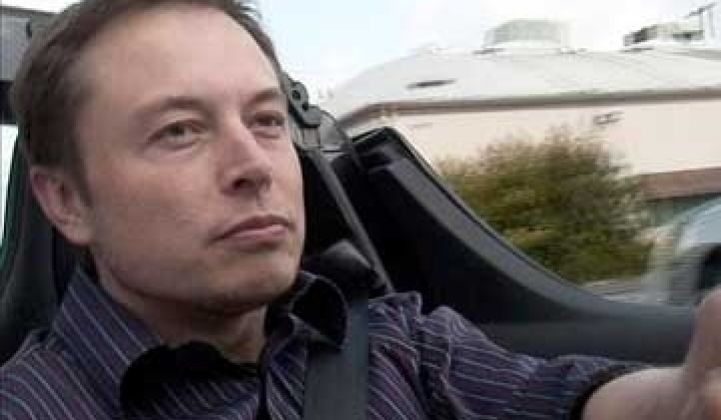Tesla Motors could have gone one of two ways as a company.
Microsoft or MicroUnity.
You, of course, know the Microsoft story. Bill Gates and Paul Allen formed the company to sell software applications. When IBM decided to build a PC, Microsoft won the contract to supply an operating system that it didn't own at the time. Imitation PC makers like Compaq -- and worldwide fame -- followed.
MicroUnity may not be so familiar. Founded in 1988 by Rhodes Scholar and chip whiz John Moussouris, the company created a multimedia chip for powering TVs, phones, and someday, even PCs. Millions in venture money flowed in from Microsoft, Hewlett-Packard, TCI (Now AT&T Broadband), Time Warner, Cox Communications, Motorola and Comcast, among others.
By the early 2000s, it was down to around eight employees. A payday finally came when it won a legal settlement in a patent suit against Intel in 2005.
What was the difference? MicroUnity believed it could win with technology. By making the best possible product, it felt the world would come around to its way of thinking. To some degree, failed ventures like Segway, General Magic, Transmeta, and Be all suffered from the same problem.
By contrast, Microsoft has never been a technology company. Instead, it has thrived on game theory, i.e., by creating arrangements and situations in which other parties found it more beneficial to cooperate with the company rather than to challenge it. Granted, you can't win a Nobel Prize for manipulation, but it works wonders. Just ask Otto von Bismarck.
One of the largest distributors of Microsoft software once called the company's contracts "intelligent entanglements." You'd sign the contract, he explained, and then about three weeks later, finally begin to understand how all of the interweaving contingencies and bonus programs created a situation where a company would have to dedicate almost all of its resources to selling Microsoft products at the expense of other software.
You will get wealthy by making us rich -- that was the proposition Microsoft offered others. And the computer world acquiesced. (See test drive of the Roadster here.)
Tesla has always touted its technology and said its mission was to wean the car industry off of fossil fuels. But it has really moved ahead by exploiting the emotional levers of mainstream auto makers and consumers to its advantage, just like Microsoft. Deals and perceptions, more than battery management, have been the keys to its success.
When it took the wraps off its prototype in 2006, it invited the cream of Hollywood to a Santa Monica event to create buzz. Mike Eisner, looking like Andre the Giant in a pullover sweater, attended along with a who's-who list of luminaries.
The founders, moreover, didn't come across as conventional electric car advocates. They weren't spouting off about conspiracies among auto makers or the evil nature of oil companies. The whole 'you can turn this lawnmower into a hydrofoil' ambiance that had long surrounded all-electric cars vanished. Instead, Tesla promised consumers they'd be the envy of their neighbors.
With a twinge of envy at Tesla's progress, General Motors launched the Volt effort. Daimler -- a laggard in electric cars -- invested in Tesla in 2008. At car shows, the little company is constantly getting mobbed.
Earlier this month, Tesla's crowning achievement occurred when Toyota agreed to invest $50 million in the company and said Tesla would provide technology for its own electric car. SEC documents show that Tesla paid $42 million for the NUMMI factory. Put another way, Tesla got paid $8 million dollars to take ownership of a well-regarded manufacturing facility.
The deal came about because Musk reached out to Toyota chairman Akio Toyoda and took him for a ride in an all-electric Tesla Roadster. "I felt the wind -- the wind of the future," Toyoda said when he rode in the car.
And no doubt the thought of Nissan, the distant number-three in Japan's clubby auto world, becoming the world's most talked about car company with the Leaf crossed his mind, as well. Would the goodwill and buzz generated by the Prius in the past decade be forgotten? With a little help, could Toyota usher in a second decade of automotive leadership?
Don't forget, it wasn't that long ago that Toyota remained a bit skeptical of lithium batteries and electric cars. Look at the Toyota corporate chart in this photo. The technology on the "inferior" side of the chart for energy density represents lithium-ion batteries.
"Lithium ion batteries will probably be used in vehicles, but we still have problems," Masatami Takimoto, who oversees technology at Toyota, said when he showed that slide. “We should assume that electricity and fuel cells will be necessary."
If you look back five years ago, biofuel cars seemed like a more realistic option. Headlines about people filling up their cars with the deep fat fryer drippings at Long John Silver's ran regularly in newspapers. Now, consumers are enamored with electrics, and biofuel makers talk more about airplane fuel and long-haul trucks. The tide turned, but it's not like batteries have progressed astoundingly in this short period of time. It generally takes ten years for battery performance to double. That slide from Toyota seemingly giving the thumbs up to fuel cells? It comes from the fall of 2008, about 20 months ago.
Will Tesla make it? Maybe not. Car companies take millions to get off the ground and start-ups rarely survive. Ben Rosen, the man behind Compaq, tried to reinvent cars with Rosen Motors. It flopped. Many of the Chinese companies with international expansion plans have government support that makes the millions forwarded to Tesla by the Department of Energy look like chump change. And Musk, in the throes of a divorce, ran out of money himself.
But the company has already had a historical impact and convinced an entire industry to shift gears. And it did so by playing on pride, fear and interest.



